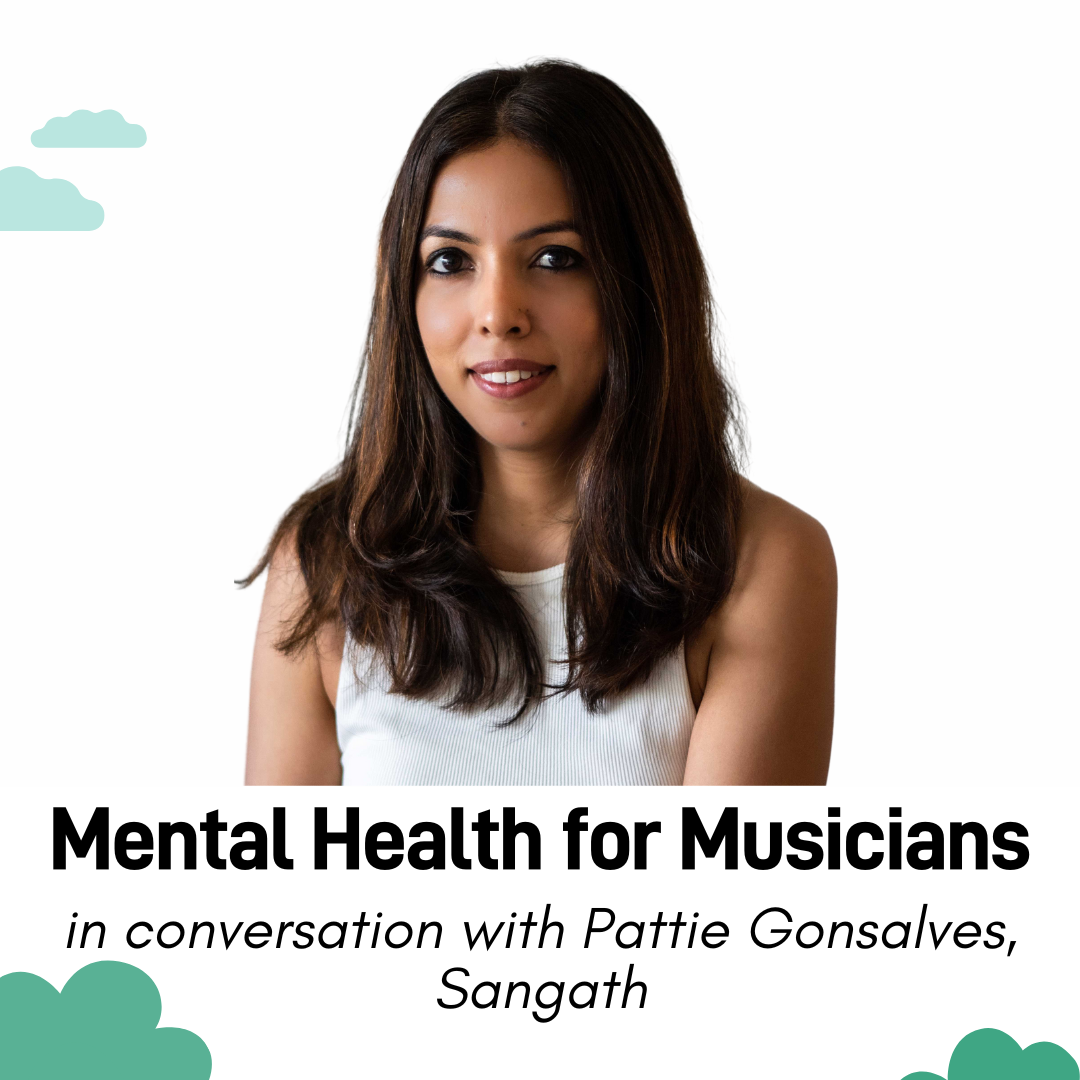
23 Jun Mental Health for Musicians- in conversation with Pattie Gonsalves, Sangath
Mental health is one of the essential pillars of health often overlooked by many. This rings particularly true for musicians, whose chosen professional path pose unique challenges to their overall health and wellbeing. To decode the conversation around mental health for musicians, we spoke to Pattie Gonsalves, Project Director at Sangath- a leading mental health organisation in India.
In your experience working with artists, what have been the key challenges they face that pose a threat to their mental health and wellbeing?
A couple of years ago, we had an event where we hosted various artists in dialogue with a therapist. What was interesting in the discussions we had was that the difficulties faced are in many ways not so distinct from what young people in other industries face. But there were a couple of things that were unique like navigating uncertainty. In a country like India, art and music is an extremely unregulated field and you don’t always go to college, afterwards you don’t know what job you will get, and you don’t have a fixed income. These are huge stressors for young people entering the workforce. I don’t have answers to these challenges and I believe that the solutions will lie in people forming groups, lobbying and advocating for more structure in their employment opportunities through contracts; and jobs that assure you some number of months, income or additional benefits– all of which don’t exist at all at the moment.
How does one recognise the need to seek professional help?
If you are finding that you have tried all the self-care and self-management tools but it is not helping then that is a good time to talk to someone else. Seeking professional help is actually a really good way to practice self-care because an important part of self-care is acknowledging where you need more help and there are no rules for seeking help. If your struggles are getting in the way of your day-to-day, for example, if you are unable to focus in class, complete your work on time, or you can’t study the way you would like- it might be a good time to talk with someone.
What advice would you impart to someone who is trying to support a loved one experiencing distress?
The first thing would be to listen to what they are saying and ask questions that will help you to understand them better. If someone has expressed to you that they are struggling, listen to them to see what they are struggling with. Ask them what is bothering them, if something has happened, or if they would like help and suggest a few options based on what you know. You could suggest a support group or helpline and ask if they want help with checking it out. You can also offer to find information for them. It would help if you have a good grasp of formal support options like a list of available support options in your city, or even websites that have this information put together. Focus your help on what the person is asking for and what they need– not on what you think might be best for the person. The other important thing is that not all help can be coming from the outside. Having good knowledge and the right tools to implement self-care, and self-management techniques can be really helpful in the event that perhaps it is a difficulty they can or want to manage on their own. I cannot emphasise enough the importance of listening to what the person is saying.
It is also important for you to find for yourself check-in mechanisms that work for you. Knowing a loved one is experiencing distress is hard but knowing the line that you need to draw for yourself as someone who is helping is important. You have to remember that it isn’t always your responsibility to be the person providing the support but it is if you have the knowledge, the ability and capability to do it. If you are trying to help, you will feel more confident as a friend or family member if you have the information handy.
How would you recommend supporting someone who doesn’t think they need support but from your standpoint, they do? Additionally, what advice would you give to someone trying to support a loved one who isn’t open to talking about their feelings, emotions, and mental health?
It’s not a simple answer. The first thing to say is we all experience distress at different times in our lives and we all need different kinds of help for the distress we experience. No two people experiencing the same problem will necessarily have the same way of getting help or the same way of addressing that difficulty. The question about the openness to talking about it is a very complicated answer because it depends on so many factors within and around someone enabling them to feel confident in articulating how they are feeling. This could be from something as basic as not having the right language to express your thoughts and feelings because you just haven’t learned it, to not having the right people and space in your surroundings with whom you can share this experience and who will know what to do with that information to help you in a meaningful way. I would say think from the point of view of that person because if someone is in distress, it’s possible that they don’t know what their options for help are or that there are various barriers in their way to accessing the help. The barriers could be because they don’t know how to talk about it, they don’t have the resources for it or perhaps they don’t have the network in place to be able to access the help. The first thing to remember is that you cannot force someone to talk if they don’t want to and you cannot force someone to get a certain kind of help if they don’t want to. But what you can do as somebody who cares is listen, ask the right questions, offer inputs if they are willing and ask for suggestions.
Help doesn’t always have to come from a formal source- it can come from a helpline, support group or a listening circle. It can even be as simple as reading a self-help resource. The other thing on the issue of talking is that it is kind of a circle in a way- the more we talk, the more others will feel comfortable to talk. Not everyone is willing or able to speak about their experiences at a specific time and patience is very important. Don’t give up just because someone isn’t talking about it because we don’t know what it is and don’t know what barriers are in their way. Certain scenarios or situations might better help someone share- it could be forwarding a blog to them or sending them a video of someone else talking about their experience, or it could be talking about your own experience with them. Giving people the space and time until they are ready and being patient is very important. You cannot push help on someone else if they don’t feel ready or don’t see the value in it right now. It is important to respect those boundaries as well because you don’t want to turn them off from getting a certain kind of help in the future when they are ready to do it.
What advice would you impart to young people who are in the process of finding the right mental health professional for them?
A colleague who is a therapist said to me that finding a therapist is like shopping for a different kind of doctor. For example if you are shopping for a GP, you would want to find the best GP for you. If you went to one GP and you didn’t like something about them, you would find a new GP- you wouldn’t say that you are done with GPs for life and that you are never going back. Adopt a similar strategy for finding a mental health professional. What has helped me is looking the professionals up online and asking friends for their perspective based on their experience of a specific person. But I say this with the disclaimer that people’s experiences are extremely different with therapy and therapists so judge for yourself if that’s an option for you. Doing homework on whether or not the style of treatment a therapist is offering is something that you like or feel will work for you is important. Don’t be discouraged if the first therapist didn’t work out for you. It will take time to find the right kind of help and the right person. The other thing is that it might not be just one option that works for you- you might also want to join a support group and do some self-management activities. There is a bit of misconception about therapy and how it is a life sentence. Therapy can last anywhere between a month to three months or a year. I think of it as a physical exercise. It is like a painful muscle that you haven’t stretched in a long time so there is a bit of stiffness and pain but then those muscles start getting stronger – this has been a helpful analogy for me to understand therapy.
What are your top tips for self-care and self-management?
The first thing which is easy to talk about and very hard to do is find time and ways to relax and focus on relaxation- it could mean going for a walk, sitting and resting for 15 minutes, or stretching. Nourish your relationships. When our mood is down and when our mental health is not in a good place, it can make your day-to-day social interactions tiring, stressful and overwhelming, which can push us to isolate ourselves. This links in especially with the kind of work artists and musicians do where a lot of time is devoted to self-practice alone, and you are not always working with other people which can feel a bit isolating. This is why it’s so important to find those everyday connections- whether it is with another student, a teacher or someone else in your network- to talk about how you feel and share your experiences. Another great self-care tool is finding ways to help other people which is a scientifically proven way to be able to help yourself. On top of these, find things you like to do and something that gives you joy- it could be having a nice cup of tea or coffee, playing a sport or going for a walk.
If you or someone you know is experiencing emotional distress, you can:
- Call the toll-free helpline 011-41198666 for free telephone-based counselling
- Contact a mental health support service
Pattie Gonsalves is a mental health researcher with a background in psychology and global health. She brings specific expertise in engaging youth with lived experience in programme development, research and advocacy. Presently she serves as a Project Director at Sangath, an Indian mental health research non-profit where she directs a portfolio of participatory youth research projects and digital innovations supported by Welcome Trust, Comic Relief and Grand Challenges Canada. Pattie founded the ‘It’s Ok To Talk’ national public engagement campaign recognised by Facebook as one of 2019’s top 10 international mental health youth projects. She is completing her PhD in psychology at the University of Sussex, UK.
Interviewed and edited by Senjuti



No Comments